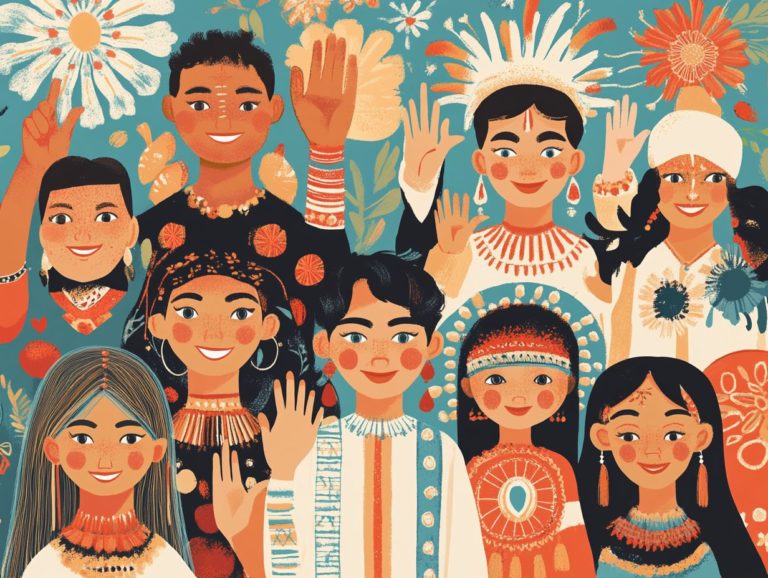understanding humor in different cultures
Humor is a universal language, yet it varies significantly across cultures.
This article invites you to explore the captivating world of humor, examining its diverse forms and functions within different societies. You ll discover how historical events, religious beliefs, and social norms shape what various people find amusing.
It also addresses the challenges that arise when humor crosses cultural boundaries and the misunderstandings that can often follow. You will also learn about the benefits of embracing cultural humor as a means to foster connection and enhance your cultural competence, which is the ability to understand and engage effectively with people from different backgrounds.
Embark on this enlightening journey through the laughter that both unites and divides us.
Contents
- Key Takeaways:
- Types of Humor Across Cultures
- Factors Influencing Humor in Different Cultures
- Challenges and Misunderstandings in Humor Across Cultures
- Benefits of Understanding Humor in Different Cultures
- Frequently Asked Questions
- What is the importance of understanding humor in different cultures?
- How does humor differ between cultures?
- Can humor be misunderstood in different cultures?
- How can I improve my understanding of humor in different cultures?
- Is it appropriate to use humor in cross-cultural interactions?
- How can understanding humor in different cultures improve my cultural competency?
Key Takeaways:
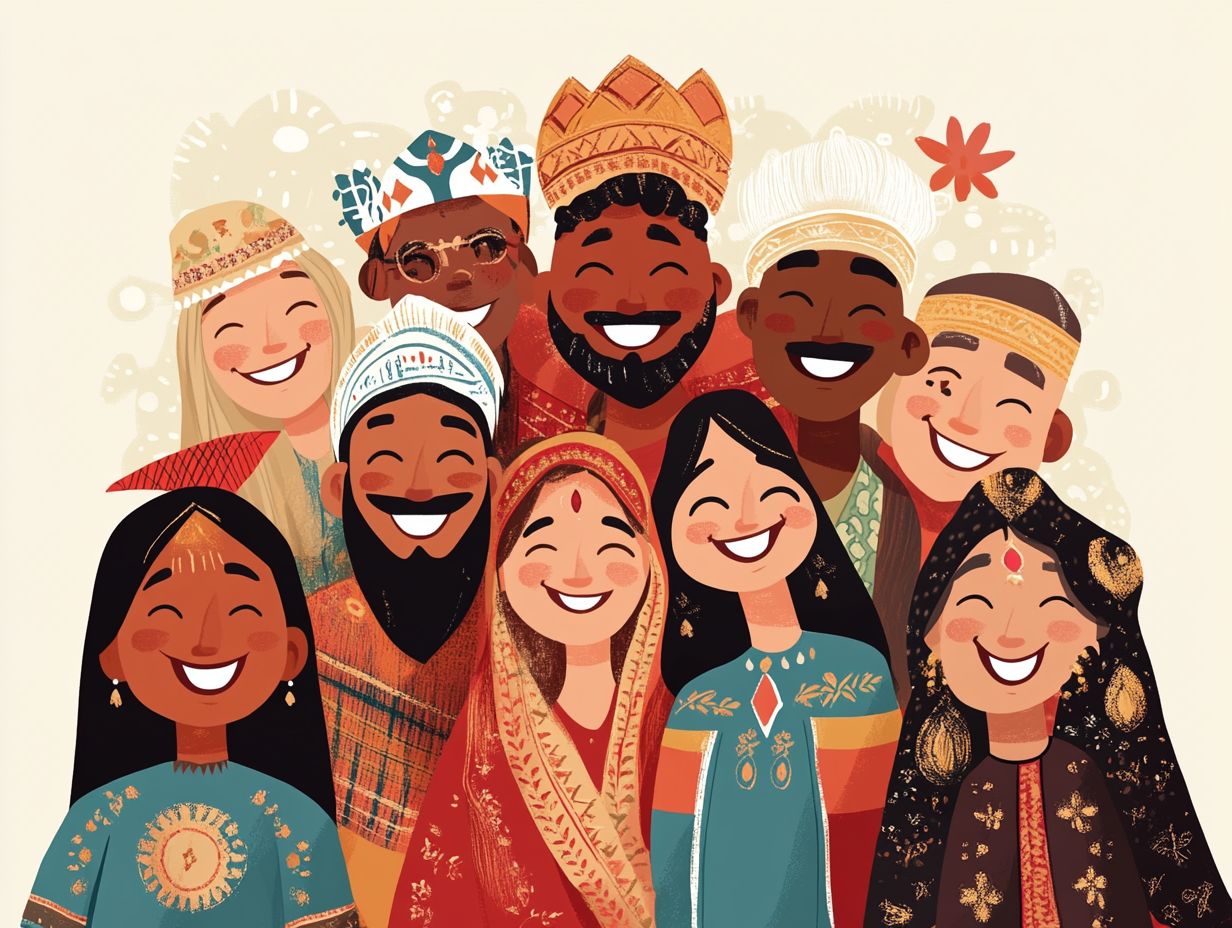
Humor is a universal human experience, but it takes on different forms and meanings in different cultures due to factors such as history, religion, and social norms.
Understanding the cultural context of humor is crucial in avoiding misunderstandings and building meaningful connections with people from different backgrounds.
By developing cultural competence and sensitivity to humor, we must bridge cultural gaps and foster understanding and unity among diverse communities.
Defining Humor and Its Role in Society
Humor, a multifaceted phenomenon that transcends cultural boundaries, plays a vital role in social interactions. It enhances emotional well-being and serves as a coping strategy during challenging times.
From self-deprecating humor to dark humor, its diverse forms reflect the intricacies of cultural differences and how individuals perceive humor across various societies. This shapes group dynamics in both personal and professional contexts.
When you examine humor through the lens of cultural references, it transforms from just a source of laughter into a profound tool for understanding human relationships. It helps bridge the gaps between Eastern and Western humor styles and navigate social norms.
Its significance stretches far beyond mere entertainment; it fosters connections among individuals by providing a shared experience that can dissolve tension and build rapport.
For instance, self-deprecating humor allows you to relate to others through shared flaws, creating an atmosphere of vulnerability that encourages openness. On the other hand, dark humor can enable you to confront fears or societal issues, making it easier to engage in difficult conversations.
In various cultures, laughter becomes not merely a reaction but an important social lubricant. It facilitates community ties and resilience in the face of hardship, ultimately reinforcing the human spirit.
Types of Humor Across Cultures
Humor takes on many fascinating forms across cultures, from British humor to Chinese and American styles. Each is shaped by distinct social norms, historical contexts, and regional traits that define them.
You’ll find a rich tapestry of expressions, ranging from the light-heartedness of slapstick to the sharp nuances of political satire.
By exploring these varied humor styles, you gain insight into how different societies embrace laughter and navigate cultural taboos. For example, while self-deprecating humor might flourish in Canadian and British settings, it could stumble in cultures where such expressions are less socially accepted.
Exploring Different Forms of Humor
Exploring the various forms of humor reveals a fascinating spectrum. It spans from adaptive humor, which nurtures resilience, to maladaptive humor, which can hinder relationships.
The nuances in different styles, like dark humor and self-deprecating humor, showcase how you might use humor based on your experiences and cultural context.
This exploration highlights the significance of context in humor usage. It also illustrates how humor serves as both a bonding tool and a mirror reflecting your psychological state.
Across cultures, reactions to dark humor can vary dramatically. In some societies, it becomes a coping mechanism for trauma, while in others, it may be met with resistance or disapproval.
Self-deprecating humor often shows your self-awareness and humility. Yet, it might also reveal deeper insecurities or act as a barrier to genuine connection.
Psychological insights suggest that adaptive humor can enhance your well-being and facilitate social interactions. In contrast, humor that can harm relationships may lead to misunderstandings and emotional distance.
When you understand these dynamics, you can better connect with others, enriching both your personal and social experiences.
Factors Influencing Humor in Different Cultures
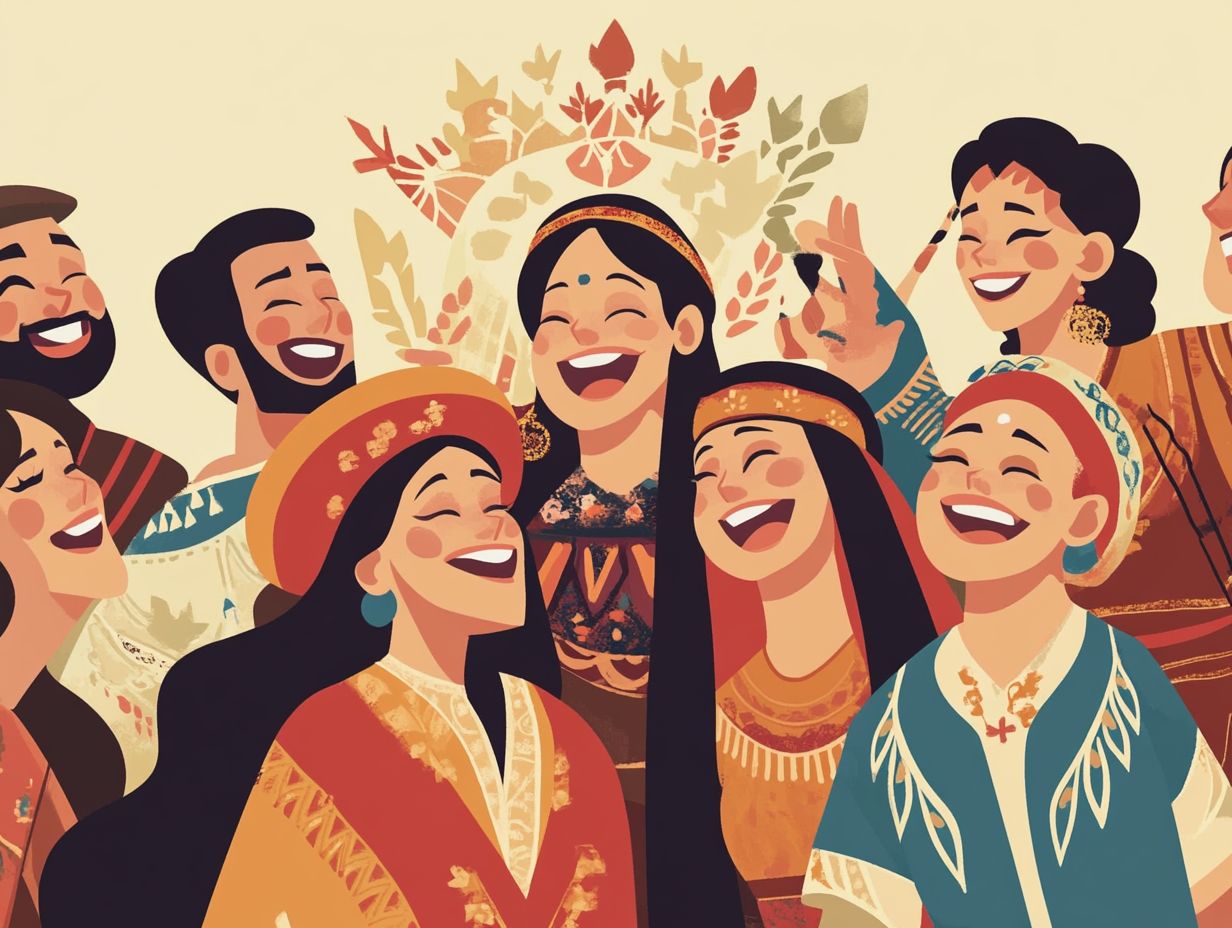
Several interrelated factors, including history, religion, and social norms, profoundly influence humor across cultures. These factors shape its perception and application within various societal contexts.
Cultural differences dictate what is deemed appropriate humor. A joke that resonates in one society may easily offend in another.
Historical context, including political climates and social movements, plays a pivotal role in the evolution of humor. This affects how themes like political satire are expressed within group dynamics.
Impact of History, Religion, and Social Norms
The impact of history, religion, and social norms on humor is profound. They shape not only what you consider acceptable but also how humor resonates with different audiences.
Historical events such as wars or social upheavals often give rise to specific humor styles that mirror societal sentiments.
Your religious beliefs can dictate the boundaries of humor, influencing everything from comedy channels to the cultural references in jokes. Humor serves as a lens to explore the values and taboos of various cultures.
Consider post-war societies, where dark humor emerges as a coping mechanism. Look at the humor that developed in Europe after World War II; dark jokes about life’s absurdities flourished, revealing a unique way to confront hardship.
In contrast, cultures with strong religious influences such as many in the Middle East often lean toward satire that navigates sensitive topics. This reflects community values while still encouraging laughter.
These variations illuminate how distinct historical contexts and religious frameworks shape the content, delivery, and reception of comedic expressions. Humor becomes a dynamic reflection of the human experience.
Challenges and Misunderstandings in Humor Across Cultures
Navigating cultural differences can pose significant challenges and lead to misunderstandings in humor. This often results in misinterpretations that strain relationships or ignite conflicts.
You may find that humor perception varies widely across societies. Cultural taboos shape what is considered funny or offensive, creating cross-cultural humor challenges that are hard to navigate.
For example, a joke that elicits laughter in one culture might be met with confusion or outrage in another. This makes it essential for you to grasp these nuances when engaging with humor in a global context.
Navigating cultural differences in humor requires understanding various styles and how they affect communication. When you learn to appreciate cross-cultural humor, you enhance connections with others.
What brings joy in one culture might not work in another. Cultivating empathy and curiosity helps bridge gaps and strengthens relationships.
Understanding humor s nuances, like wordplay or sarcasm, is challenging yet rewarding. A joke that makes people laugh in one culture might fall flat in another, which highlights the importance of open-mindedness.
By learning about humor, you can respect cultural differences and explore various comedic styles. Laughter is a universal language that breaks down barriers and fosters connections.
Events that celebrate diverse comedic perspectives show how humor transforms interactions and promotes inclusivity.
Benefits of Understanding Humor in Different Cultures
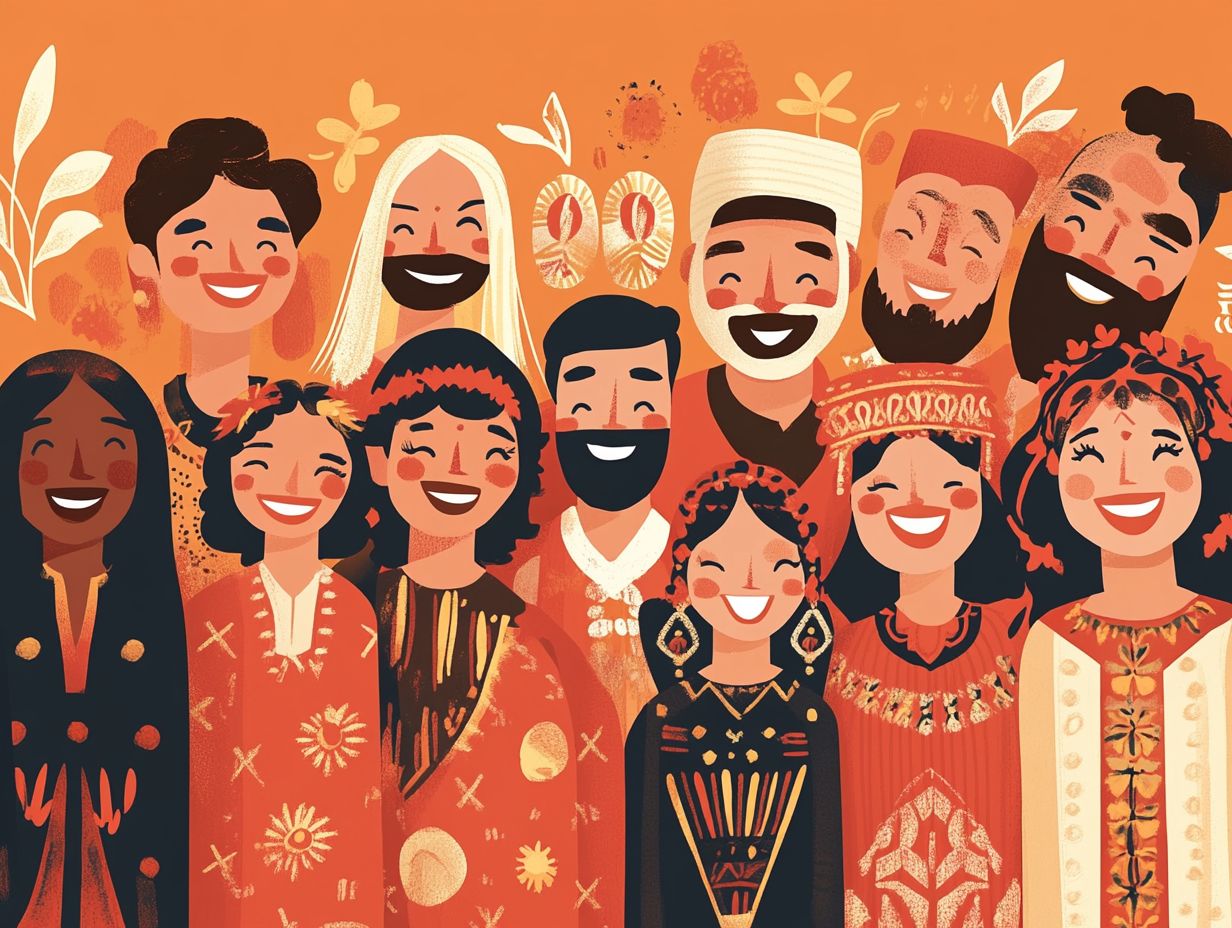
Understanding humor across cultures offers many benefits. It enhances your ability to connect with others in our globalized world.
Exploring humor styles helps you build empathy and enrich your knowledge about humor. This understanding can significantly boost your well-being.
Building Cultural Competence and Connection
Building cultural competence through humor fosters meaningful connections. It encourages openness among individuals from diverse backgrounds.
Engaging in humor education teaches you about different cultural expressions of humor. For example, a lighthearted joke can lighten tensions and unify people.
In workshops, participants share personal anecdotes. This leads to eye-opening insights about stereotypes and builds empathy.
Laughter creates an inviting atmosphere essential for meaningful dialogue and stronger community bonds.
Frequently Asked Questions
What is the importance of understanding humor in different cultures?
Understanding humor in different cultures is crucial for effective communication and building relationships. Humor is a fundamental aspect of culture and can vary greatly from one culture to another. It helps us navigate social norms and can even reveal deeper insights into a culture’s values and beliefs.
How does humor differ between cultures?
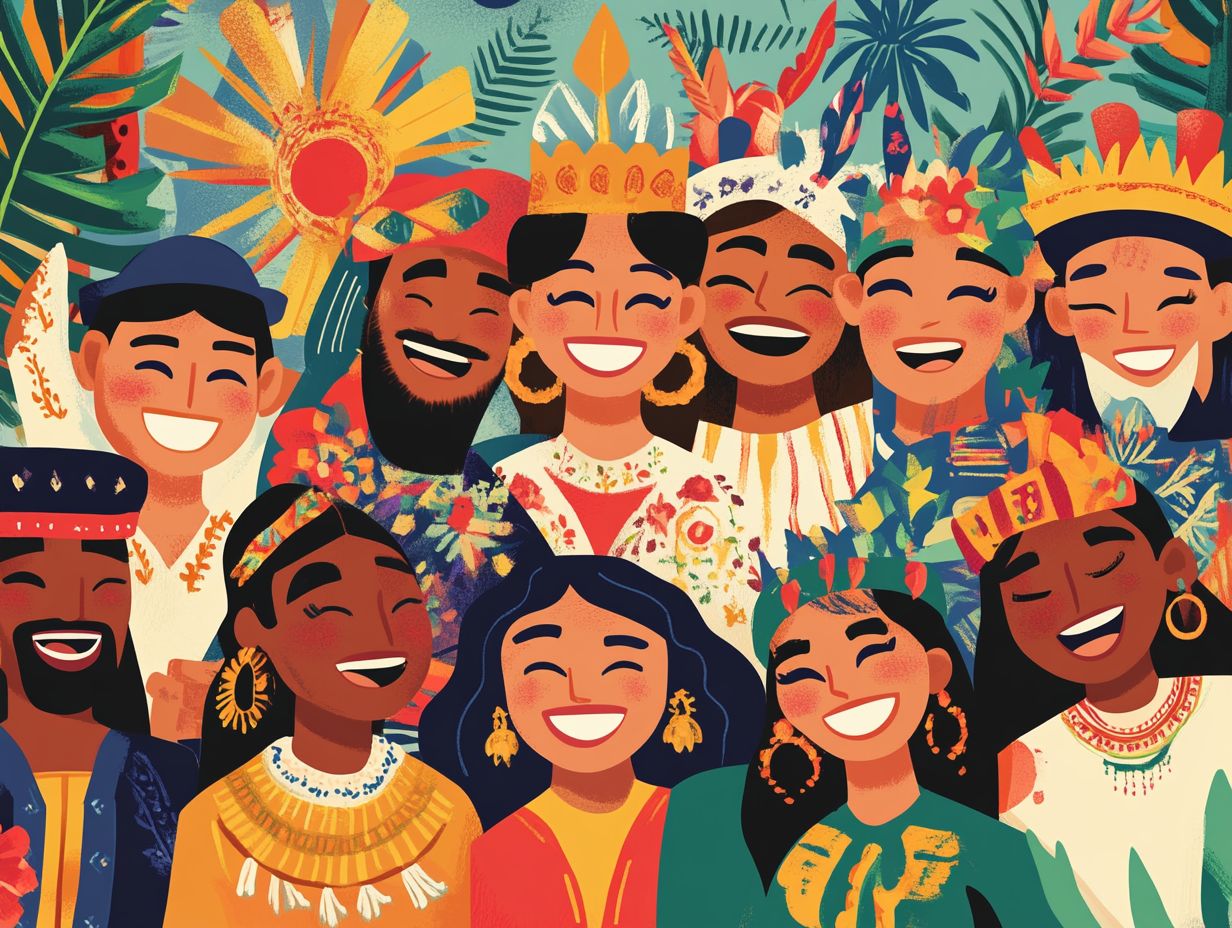
Humor can differ in various ways between cultures, including the use of different types of humor, such as slapstick, satire, or wordplay, and the topics that are considered funny or taboo. Delivery and timing can also vary, as well as the use of body language and facial expressions to convey humor.
Can humor be misunderstood in different cultures?
Yes, humor can be easily misunderstood in different cultures. What may be considered funny in one culture may be offensive or confusing in another. It’s important to be aware of cultural differences and to take the time to understand the context and nuances of humor in a particular culture to avoid misinterpretation.
How can I improve my understanding of humor in different cultures?
There are several ways to enhance your understanding of humor across cultures. Start by reading about the culture’s history, customs, and values to gain valuable insights.
Immerse yourself in the culture as well. This can mean traveling there or spending time with people from that culture.
Is it appropriate to use humor in cross-cultural interactions?
The appropriateness of humor often hinges on context and your familiarity with the culture. Humor can be a great way to connect, but tread carefully.
What seems harmless to you could be offensive to someone else.
How can understanding humor in different cultures improve my cultural competency?
Understanding humor enhances your cultural competency by helping you navigate differences more effectively. It also fosters stronger relationships since humor often builds connections.
Being aware of what is funny in different cultures allows you to avoid missteps and communicate better.


